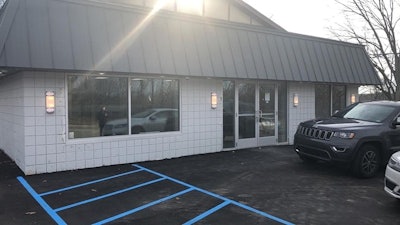
Just over a year after launching an innovative cannabis kitchen concept in Arizona, The Mint Dispensary has its sights set on expanding its brand to Michigan’s medical cannabis market.
RELATED: The Mint’s Cannabis Kitchen Serves Up Infused Meals
The company currently operates two medical cannabis dispensaries in Arizona—one in Mesa and another in Guadalupe. Now, The Mint plans to expand it's national footprint with the branding of two dispensaries (or, more appropriately for Michigan, "provisioning centers"), as well as introducing their product lines to a cultivation and processing facility in the Michigan market. The first provisioning center with the Mint brand is expected to launch in Kalamazoo in the next month.
Joey Kejbou and Omar Fakhouri are the Michigan license holders who will introduce the Mint brand to the Michigan market.
The 3,500-square-foot provisioning center will carry hundreds of cannabis products, including flower, edibles and concentrates. Approximately 20 budtenders will be on-site to serve patients, and the team will have access to up to 16 registers at a time.
The Kalamazoo location will feature an educational area where patients can learn about medical cannabis and receive health-related information. From time to time, as permitted by state regulations, the provisioning center will also host guest speakers familiar with the cannabis industry.
The Arizona-based Mint team is quickly learning the nuances Michigan market. While regulatory differences have created a hurdle, the Mint team believes their proof of concept and success in Arizona can be successfully integrated into the Michigan market.
“Understanding market differences is crucial to the brand's operations,” says Eivan Shahara of The Mint Dispensary. “We do our best to learn as much as possible about a new market before we consider entering it with our brand. We also need to find the right people to represent our brand.”
The major difference between Michigan and The Mint’s home state of Arizona, Shahara says, is of course that Michigan is a medical and adult-use market, whereas Arizona has not yet legalized adult-use cannabis—although it does have the opportunity to do so through three proposed ballot initiatives in 2020.
“Another big difference is that Michigan is evolving from a caregiver model into a state-run program,” he adds.
Kejbou and Fakhouri plan to rely on The Mint’s experience operating one of Arizona’s largest dispensaries to help the brand find success in Michigan.
“We plan to tailor our approach to the Michigan market because we understand that no two markets are the same,” Kejbou says. “This includes reviewing and re-reviewing everything from our operational policies and compliance procedures to employee training, product offerings and community relationships. Our goal is to create an elevated experience that brings customer service, product quality and variety/selection to the next level. In Michigan specifically, success will be determined by a provisioning center’s supply chain and subsequent ability to meet market demands.
“Sourcing enough product to meet the demand from the Michigan market is one of the most challenging aspect for provisioning centers right now in Michigan,” he adds. “One of the most significant challenges in Michigan is the cultivation infrastructure. Simply said, the state does not yet have all of the experienced, large-scale commercial cultivators it needs in the legal market to meet the demand for product at the retail level.”
The Michigan-based cultivation and processing facility, which will produce Mint-branded products, should be operational in 2020, and will help the brand offer customers more product options while also allowing greater quality control, Kejbou says.
The company plans to harness local talent when hiring staff for its Michigan facilities, he adds. “While finding staff with prior industry experience would be beneficial, we also see value in giving local residents in our facility’s locale the opportunity to join our team and rise within the organizational structure. Investing in our employees will be critical to our success."
Once operating at full capacity, assuming the supply chain issues are addressed at the state level, the Kalamazoo location hopes to employ up to 50 employees for various positions, each of which will receive a minimum grade that starts at a living wage.
“We plan to hold a job fair within the next few weeks in Michigan to build our team locally,” Kejbou says. “We’re leveraging our relationships and connections by reaching out to nearby community colleges, along with contacts in the cannabis industry and local market.”
Overall, The Mint brand is known for being community-minded and for giving back to those in need, Shahara says, and he believes these qualities will help the brand differentiate itself in Michigan’s market. This includes education sessions for patients, as well as deals and discounts to seniors, veterans and others who need cannabis to cope with life-altering illnesses and conditions.
However, The Mint Dispensary's cannabis kitchen, called The Mint Café, will remain exclusive to Arizona for the time being.
“Although state laws in Michigan and across most other states do not currently allow for a cannabis kitchen concept, we hope that policies change in the future so that we can introduce it wherever the brand exists,” Shahara says. “We worked closely with the state of Arizona to bring this one-of-a-kind concept to life and it’s been very well received by patients."

























